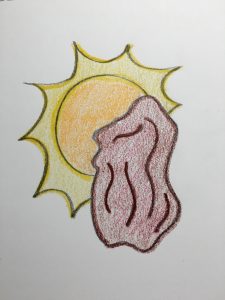 The most impactful contemplative practice for me was the first one. Eating a raisin. To be honest, I have never really been a raisin fan, they’re too sweet and I find the texture to be a little bit disturbing. Regardless, I shovel fistfuls of Trailmix into my mouth between classes and bites of raisins sneak in there. That’s normally the context in which I deal with raisins. I don’t think about food in those moments as anything more than fuel. It’s a chore, a hassle, an annoyance. Eating a raisin in the dark, was a pause from this daily grind of a relationship I have with eating. It was a combination of slowing down, being present and also getting a bit of history and context for this small shriveled snack.
The most impactful contemplative practice for me was the first one. Eating a raisin. To be honest, I have never really been a raisin fan, they’re too sweet and I find the texture to be a little bit disturbing. Regardless, I shovel fistfuls of Trailmix into my mouth between classes and bites of raisins sneak in there. That’s normally the context in which I deal with raisins. I don’t think about food in those moments as anything more than fuel. It’s a chore, a hassle, an annoyance. Eating a raisin in the dark, was a pause from this daily grind of a relationship I have with eating. It was a combination of slowing down, being present and also getting a bit of history and context for this small shriveled snack.
I had never questioned the history of the raisin. How did this food end up in my handfuls of Trailmix? Who picked it? Where did it grow? How was the land treated? A cascade of questions stemmed from one activity. I don’t think contemplative practices alone have changed the way I look at my food, it’s probably a combination with enlightening information from the readings and lecture, regardless I have noticed a change in the way I interact with food. I think about corn and nitrogen fertilizers and the instability of cheap food and I get nervous. I don’t want to be reliant on a food system that forces developing countries into submission and destroys the planet. This practice was mostly a reality check that food is more than food. It has a history that continues to be woven and stepping back, eating a raisin slowly in the dark is an important step in the direction of awareness.

Hi Claire! I love the little doodle. And by the way, I don’t like raisins either–dried fruit is generally a no-go for me. I think it’s the texture, too. Anyway, your quick input on being “reliant” and forcing submission made me nervous as well. I know it’s hard to fully elaborate in such brief blog posts, but I felt that sentence was a lot to unpack. And you’re totally right; in the US many of us are lucky enough to just think of food as food. I hope it becomes more and more important for the American people to think about the broader systems behind food production, so we can start to dismantle their worse aspects. I love that a simple raisin gathered all this feeling for you.